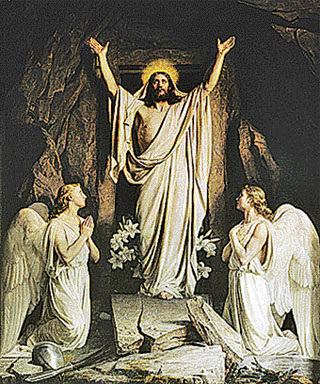|
Today is
Easter Sunday
Why is Easter so late
this year?
Easter Sunday is a day of significance for the followers of Jesus
Christ because it marks His resurrection from the dead. The lent period
which commenced on Ash Wednesday ends with Easter Sunday which falls on
April 24 this year.
Why is Easter Sunday late this year. Easter is usually at the end of
March or early April, before the Sinhala and Tamil New Year. Last year -
2010 - Sunday April 4, was Easter. In 2008 Easter was as early as March
23. But this year Easter comes much later than in 2010.

Has Easter been as late as this in any other year? Yes, it has. In
2003 Easter was on April 20. In 2000, Easter was as late as this year
and fell on April 23.
Unlike Christmas, Easter has no fixed date. It varies between. March
22 and April 25, like Wesak, which can be any day between the last week
of April and the last week of May. This is because the dates of both
celebrations are determined by the full-moon, and the full-moon day
varies from month to month.
In those far of days, nearly 2000 years ago the spiritual leader of
Catholics and Christians when Jesus was living, there were no calenders.
Therefore there is no record anywhere to say the exact day on which
Jesus was crucified. What came down by word of mouth, was, that He rose
from the dead two days after He was nailed to the cross.
The Resurrection (rising from the dead) of Jesus was something very,
very important and joyful to the followers of Jesus; yet as the years
passed no one knew when exactly it had happened.
In the early days, in fact for few hundred years, the Resurrection
was celebrated on a day close to the Passover, one of the main festivals
of the Jews. Each country had the celebration on a different day.
The Passover is celebrated in memory of the freeing of Jews from
Slavery in Egypt. It is a time of rejoicing with feasts, song and games.
The Hebrew (language of the Jews) word for Passover is Pesach which
has given pasqua in Italian, Spanish and Portuguese. The Sinhala word
for Easter - Paaskue - is from Portuguese.
As Pasque was celebrated in different days in different countries, a
council was held to settle the matter.
In the year 325 AD. the Church Fathers met at Nicaea in Asia Minor on
the orders of Emperor Constantine to fix the date for the celebration of
the Resurrection.
 It
was at this meeting which is known as the First Nicene Council, that the
Church Fathers fixed the date as the first Sunday, after the first
full-moon, on or after March 2. (I take it that you know the
significance of the date, it is the equinox when the Sun is directly
overhead the Equator). So, Easter can be any day between March 22 and
April 25. It
was at this meeting which is known as the First Nicene Council, that the
Church Fathers fixed the date as the first Sunday, after the first
full-moon, on or after March 2. (I take it that you know the
significance of the date, it is the equinox when the Sun is directly
overhead the Equator). So, Easter can be any day between March 22 and
April 25.
In 2005 the full-moon was on Friday, March 25. So, Easter was on
March 27. Full-moon day and Good Friday coincided that year. In 2001
Good Friday and New Year's Day coincide. In 2008 Friday March 21 was
full-moon day. So Easter was as early as March 23.
Easter is so late this year because the first full-moon after March
21 is nearly a month later - April 17.
The first full-moon after March 21 is called the Pasch moon. Pasch is
a Hebrew word. At the council in Nicea it was decided that if the Pasch
moon is on a Sunday, as it is this year, Easter shall be the next
Sunday. That is why Easter is so late this year.
Why is this celebration called Easter in English? In the languages of
Southern Europe - Italian, Spanish and French the word is pasqua or
something similar going back to the Hebrew Pascho. The English word goes
back to pre-Christian times in England. Estore was Anglo-Saxon goddess
who represented light or spring. Anglo Saxons lived in England before
the Normans from France conquered England in 1066. They are the
ancestors of the English.
The Anglo Saxons held a festival in honour of this goddess every year
about this time of the year - the spring equinox when the warm sun and
green grass start to push aside the snow and ice and the dreary cold of
winter. The springtime festival became a Christian festival but the old
name remained with only a slight change.
- Sumana Saparamadu |

